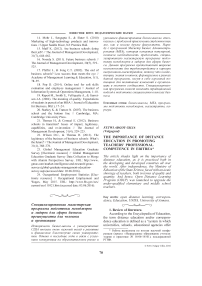Важность дистанционного образования при формировании учительской профессиональной компетенции в Эритрее
Автор: Fetwi Adgoy Gilia
Журнал: Известия Волгоградского государственного педагогического университета @izvestia-vspu
Рубрика: Педагогические науки
Статья в выпуске: 5 (109), 2016 года.
Бесплатный доступ
Рассматривается важность дистанционного образования, которое практикуется во всех развитых странах мира. После получения независимости государства Министерство образования Эритреи столкнулось с недостатком учителей, как качественным, так и количественным. В этой связи была создана Открытая дистанционная образовательная программа (ОДОП), цель которой - повышение квалификации учителей начальной и средней школы.
Открытое дистанционное обучение, заочное обучение.
Короткий адрес: https://sciup.org/148166602
IDR: 148166602
Список литературы Важность дистанционного образования при формировании учительской профессиональной компетенции в Эритрее
- Carrol, D. (2004). Pedagogy and Assessment in the new curriculum, Ministry of Education, Asmara, Eritrea.
- Daniel, J. S. Mega(1996). Universities and knowledge media, Technology Strategies in Higher Education, London: Kagan Page.
- Denzin,N.K. & Linciln, Y.S. (1994) 'Strategies of Inquiry' in Denzin,N.K. & Lincoln (eds), Hanbbok of Qualitative Research, Thousand Oaks, Sage Publishers,pp. 199-208.
- Evas,T. & Juler,P. (1991). Research in distance education, London: Macmillan.
- Harry, K. (1992). 'Distance education today and tomorrow: a personal perspective ', Educational Media International, 29(3), 189-192.
- Holmberg, B.(1995). the Evolution of the character and practice of distance education, Open Learning, 10(2) pp. 47-53.
- Iyob, R. (1997). The Eritrean Struggle for Independence: Domination, resistance,nationalism:1941-1993.Cambridge University Press.
- Keast, D.A.(1997). Towards an effective model for implementing distance education programs, American Journal of Distance Education, 11(2) pp.39-55)
- Keegan D.(Foundation of distance education third edition, London: Routlrdg.
- Khan,J. (1993). Human resource development in the public sector management, 61(1) pp.48-58.
- Killion T.(1998) Historical Dictionary of Eritrea, Longman: Scarecrow Press.
- Ministry of Education, UNESCO and the government of Italy(1996). Guidelines for a policy framework on distance education,Asmara, Eritrea (23 January)
- Ministry of Education (1999). Our People are our Future: a framework for the development of human resources in the education sector, Asmara, Eritrea,
- Ministry of Education, (2003) Eritrea: Basic Educational statistic 2002-2003,pp.2-3.
- Ministry of Education, (2006). 'Tertiary education in Eritrea, issues policies and challenges', Eritrean Profile,13(56-57) (part I and II on 20 and 23 Sept, pp.2-3.
- Ministry of Education (1996). Brief Description of DEPETE: Tasks and Achievements, Department of National Pedagogy. Ministry of Education, Asmara, Eritrea
- Moore, M.G.(1990). 'Recent contributions to the theory of distance education ',Open Learning,5(3) pp.10-15.
- Moore, M.G. & Kearsey,G. (1996). Distance Education: a Systemic view Belmont, California,: Wards Worth Publishing.
- Rena, R. (2004). Educational development in Eritrea, Eritrea profile, 11 (12), p.6.
- Rena, R.(2005). Gender disparity in education, an educational perspective, Global Child Journal (USA), 2(1) pp.43-49.
- Rena, R.(2005b). 'Financing of education in Eritrea, a case study in Zoba Maekel, the African Symposium(Albany,USa,5(3),113-128.
- Rena, R.(2006b) Eritrean Education'-retrospective and prospective 'Eastern Africa Journal of humanities and Sciences(Nairobi, Kenya, 5(2)pp.1-12.
- Rena, R(2006). Educational and human resource development in post independent Eritrea-Analysis International Journal of Educational Development using information technology(IJEDICT),Barbados, West Indies.
- Saint. W.(1999). Tertiary distance education and Technology in Sub-Saharan Africa,Washington, DC. The World Bank, ADEA working group on higher education.
- Taye,A. (1992). A historical review of the state of education in Eritrea,Asmara: Educational matrials Publication and Distribution DvissionAgency)EMPDA).
- Terry,E.& Philip Juller,(1991). Research in distance education,London: Macmillan.
- University of Asmara (2004). Records of the Consultancy and Testing Center,University of Asmara,Eritrea.
- Visser,J.(14 April 1994). Distance education for the nine high population countries, Paris: UNESCO Basic Education Division 14,april.
- Wills,B.(1998). Effective distance education planning: Lessons learned, Educational Technology,38(1).pp.57-59.


